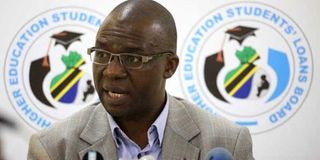HESLB names successful students

What you need to know:
The approved applicants are among the 30,000 first-year students who are expected to receive loans from the HESLB for higher education.
Dar es Salaam. The Higher Education Students Loans Board (HESLB) has released the first batch of 10,196 successful loans applicants for the 2017/18 academic year.
The approved applicants are among the 30,000 first-year students who are expected to receive loans from the HESLB for higher education.
“In this academic year, a total of Sh108.8 billion will be released for 30,000 first-year students,” HESLB director general Abdul-razaq Badru said in a statement – adding that about Sh34.6 billion of that total sum has been allocated to the successful candidates in the first batch.
Noting that this comes at a time when many universities will open for admission next month, Mr Badru said the list of successful applicants in the first batch will be sent to the respective higher learning institutions – and is also available on the HESLB website: .
“Lists of other successful applicants will be released according to the allocation trend,” he said – stressing that the ongoing allocation exercise for all fresh candidates will be completed by the end of October.
By way of elaboration, the HESLB boss said the first successful batch was drawn from 32,495 students who had applied for admission to institutions of higher learning. For those who had been accepted for admission by more than one institution – and also qualified for a loan – allocation will be made after they finally indicate a single choice of their admission.
Mr Badru also revealed that Sh318.6 billion in loans has been allocated to 93, 295 continuing students.
Addressing a press conference in Dar es Salaam on August 30 this year, Board’s chief had said that only 15,473 out of 49,282 applicants for loans had, until August 29, submitted the requisite documents for loans application through Online Loan Application and Management System (Olams).
In the event, the Board did extend the loans application deadline for new applicants from September 4 to September 11, 2017. That move did indeed enable applicants who had failed to file their applications on time to do so. In any case, some 33,809 applications were already at advanced processing stages as provided for under the Loans Board’s legislative frameworks.
The DG urged students who had not fully complied with the application processes as spelled out in the HESLB Act – including uploading the requisite documents into the system – to do so immediately so as to enable finalisation of the loans exercise.
In the academic year 2016/17, the government approved a budget of Sh483 billion for lending to 119,012 students, out of whom 93,295 were continuing students, and 25,717 new students.
In a somewhat related development, the HESLB has started disbursing meals, accommodation and tuition fees for continuing students who have passed their exams.
According to Mr Badru, the exercise, which went into operation only yesterday, is intended to end inconveniences which usually emerge at the beginning of the academic year.
As the universities are set to open end of this month, the Board is well-prepared to ensure that funds for beneficiaries are disbursed on time and in full to enable them carter to their academic needs, he said.
Last year, there were complaints from some students on delays in receiving funds for tuition fees, meals and accommodation from the Board. The delays were blamed for the financial hardships the students experienced on-campus.
The situation was becoming critical – and the Minister for Education, Science and Technology, Prof Joyce Ndalichako, had to intervene, directing the Loans Board to immediately fork out the money to all undergraduate students through their respective bank accounts.
In explaining the delay – considering that the government had released the money in good time, HELSB stated that the delay was caused by failure on the part of newly-admitted students to submit the documents that were required to support payments to them.
“As for the ‘continuing’ students, the delay in paying them was due to the failure of their respective institutions to submit their examination results as required,” said Mr Omenga Ngole, the HESLB director for Information, Communication and Education.




